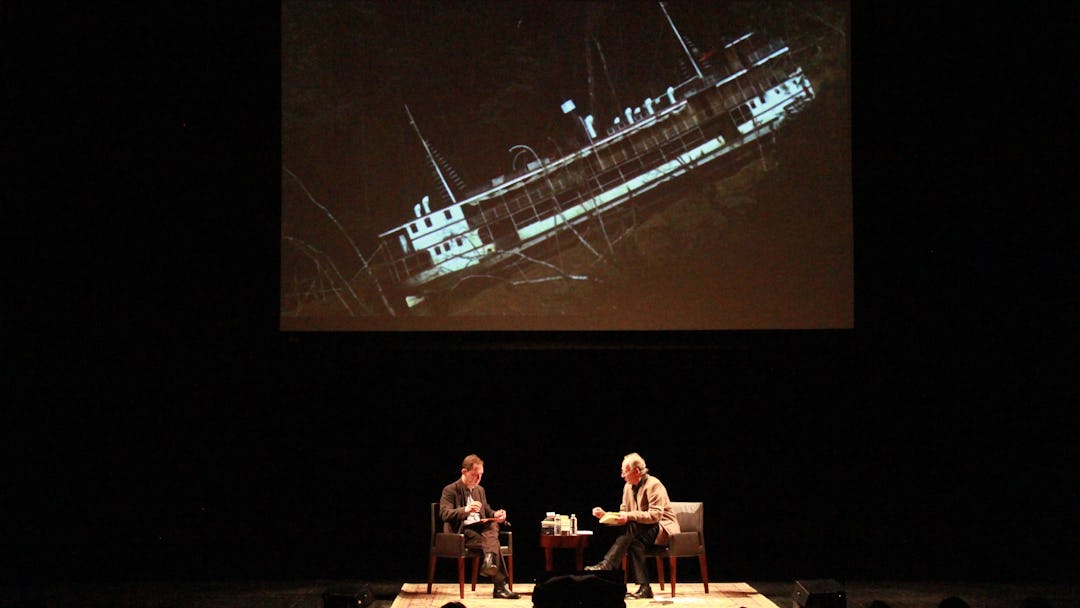When you get down to it, what’s even more odd and interesting about the fact that Warner Herzog talked about Parks and Recreation last night is how it came up. It’s not like the conversation, in front of a full house at the Brooklyn Academy of Music, pivoted from some other point about television comedy; mere moments before, Herzog was talking about Bavaria’s King Ludwig II, “the only other person who could have made Fitzcarraldo.” Up on the screen behind him came an image of the king’s famed “fairy tale castle,” which reminds Herzog of Disney World, and then he added, “Just ten days ago I acted in a tiny cameo part in a TV show called, uh, Parks and Recreation?” The audience laughed and cheered, and he went on to explain how he’s playing “an elderly guy who sells his decrepit house to the young couple who are the leading characters in this, and directly to the camera, I address the audience and I say, ‘You know, I lived in this home for 47 years. And I decided to move out now and sell this because I’m moving to Orlando, Florida, to be close to Disney World.’ I’ve never seen the show, but I hope they kept some of it.”
Chances are, if you know or care enough about Werner Herzog to have gotten this far, you read that quote with his voice in your head — the distinctive, crisp, German-accented voice that has become his trademark. We heard it first in the thoughtful, searching voice-overs of his many documentaries; it would become the key component in a persona that has made him into something of an unlikely cult celebrity, a personage spoofed by comedians and YouTube creators and, to some extent, by the man himself (in films like The Grand or even his villainous turn in the Tom Cruise movie Jack Reacher, of which he noted last night, “I did very well”).
But it is a complicated persona. When he and moderator Paul Holdengräber stepped onto the stage of the Howard Gilman Opera House for the nearly two-hour talk, each man carried a stack of papers and books, and at times, it felt less like a public event than like a casual chat between two next-level-smart guys in a library somewhere. The conversation wandered seemingly far afield, to German poets and imaginary landscapes, to Mormon Bibles and dancing chickens, to Enrico Caruso and Friedrich Hölderlin. The turns of the talk appeared so random, so intuitive, and yet, on the screen behind them, there were clips and images to accompany everything, planned and prepared and numbered even, every detour perfectly logical and expected. Just like in a Werner Herzog film.
As always, he is endlessly quotable. A filmmaker who has worked extensively in both fiction and nonfiction, he told us, “Facts really do not really constitute truth, per se.” He seeks, instead, “an ecstasy of truth,” and when Holdengräber brought up Herzog’s 1992 film Lessons of Darkness, which begins with a Blaise Pascal quote invented by Herzog, the filmmaker was unapologetic — gleeful even. “I made it up, because Pascal couldn’t have said it better.” Such deviations may terrify fact-checkers, Herzog admitted, but no matter: “Let them fact-check to their death.”
And so on. Statements like that (another example: his offhand claim that days before a female acquaintance’s death, “I released her from a spell”) are met with a mixture of amusement and confusion by a crowd like this, and to a great extent, Herzog is playing to them. The image he has so carefully cultivated over these past few decades (he turns 72 today) is equal parts refined professor — one portion of the evening turned into a full-on art lecture, complete with “Next!” instructions to move on to the following slide — and rule-breaking student. We are in awe of his accomplishments yet amused, and sometimes alarmed, by his transgressions. He has come to fill one of the oldest types in all of the movies: that of the brilliant madman.
And yet, beyond that construction, he remains what he was when he first picked up a camera nearly half a century ago: a seeker, and an observer. He read from the journal entry he wrote the day when he achieved the iconic scene, in Fitzcarraldo, of the steamship going over the mountain — during which he was totally distracted by shards of glass he had stepped on in bare feet. It concludes, simply, “All that is to be reported is this: I took part.”
In his new book of conversations, A Guide for the Perplexed, Herzog says this: “Occasionally — perhaps only a dozen times throughout my life — I have read a text, listened to a piece of music, watched a film or studied a painting and felt that my existence has been illuminated. Even if centuries are being bridged, I instantly feel I’m not so alone in the universe.” At BAM, he expanded on this idea, noting, “I make discoveries all the time, and I keep open, and I’m curious.” He also read a long quote on the back of the book, a kind of personal manifesto, which includes such advice as, “Send out all your dogs and one might return with prey,” “Learn to live with your mistakes,” “Carry bolt cutters everywhere,” “Thwart institutional cowardice,” “Ignite the fire within and explore unknown territory,” and “Get used to the bear behind you.” The cover photo is one of our grizzled author with a bear behind him. You can’t say the man doesn’t put his money where his mouth is.
Werner Herzog: A Guide for the Perplexed is out now.
